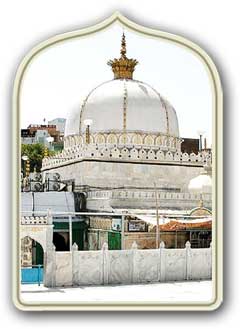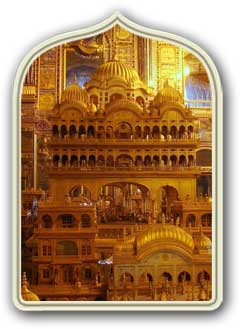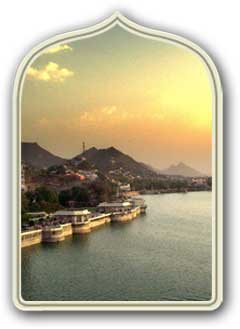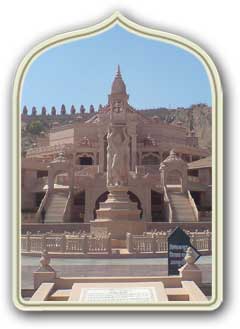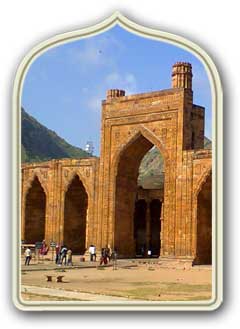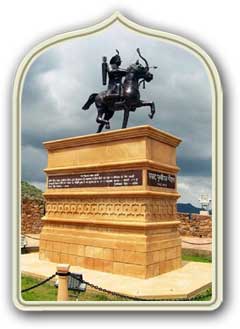
 Dargah sharif ajmer
Dargah sharif ajmer 
Situato ad Ajmer, nel Rajasthan, il Dargah di Khwaja Moinuddin Chisti è uno dei luoghi più venerati non solo nel Rajasthan ma anche in tutta l'India. Popolarmente noto come Ajmer Sharif, il dargah è visitato da numerosi devoti ogni anno.
Questi devoti includono non solo i musulmani dell'India ma anche un gran numero di indù che venerano e seguono gli insegnamenti di Saint Khwaja Moinuddin che Hasan Chisti conosce popolarmente come Khwaja Gharib Nawaz che è considerato il predicatore dell'umanità tra l'umanità.
Storia Nato nella regione Chisti in Afghanistan, Saint Moinuddin Chisti era al di sopra delle cose materiali e mondane. Nel suo processo di insegnare all'umanità lo stile di vita elevato, venne in India e si stabilì ad Ajmer. Lì, ha attratto un gran numero di seguaci che includeva anche re e altre persone di alto rango. Ad Ajmer praticava il Sufi Sulh-e-Kulh che si concentrava sull'unità indù-musulmana.
Khwaja Moin-ud-din Chishti partì per una dimora celeste nel 1256 dopo una preghiera di sei giorni in solitudine. Per commemorare quei sei giorni, l'annuale Urs, che è frequentato da innumerevoli pellegrini indipendentemente dalla loro fede, si tiene ad Ajmer ogni anno. Il santuario (Dargah Sharif) è considerato un luogo in cui i desideri di tutti sono soddisfatti. Durante il periodo medievale Akbar, il grande imperatore Mughal visitò anche il Dargah Sharif e chiese benedizioni a suo figlio.
Il Dargah Bazaar conduce al cortile interno del Dargah Sharif. L'alta porta del Dargah ha porte d'argento splendidamente scolpite. Nel cortile ci sono due enormi calderoni. La tomba di Khwaja Moin-ud-din Chishti è circondata da una ringhiera d'argento ed è parzialmente coperta da uno schermo di marmo. La sala di preghiera per devoti donne al Dargah è stata costruita dalla figlia di Shah Jahan, il re Mughal. Nei locali del Dargah Sharif ci sono le tombe della figlia di Khwaja, Bibi Hafiz Jama e la tomba della figlia di Shah Jahan.
Cosa da Vedere Ajmer
Ajmer, the ‘Heart of Rajasthan’ or the ‘City of Unity’ is truly one of the most divine and stunning tourist places in Rajasthan. Guarded by the majestic Aravalli Mountains and located around 135km from Jaipur; the capital city of Rajasthan, this ancient city is a melting point of various castes, creeds, culture, and traditions.
Founded during the late 7th century A.D. by Ajayraj Chauhan, Ajmer was initially known as ‘Ajayamru’ (Local Meaning: Invincible Mountain) and was ruled majorly by the Chauhan Dynasty. Steeped with glimpses of history, the city witnessed several upbringing and downfalls along the course of time. Ruled by the Chauhans, Mughals, Marwar, Marathas, Rajputs, and British, Ajmer is a true testimony to Rajasthan’s golden past!
Whether a Hindu or a Muslim, devotees across the country visits Ajemr with equal devotion, faith and dedication. Being the base for visiting the holy land of Pushkar; only 14km away, and also the burial ground of profound Sufi saint Khwaja Moinuddin Hasan Chisti, the city witnesses a large number of pilgrims every year. Owing to this fact, it is regarded as one of the ideal ground where ‘Unity in Diversity’ and communal harmony can be witnessed in its best form.
In addition to all this, Ajmer is also known for Mayo College, which is regarded as the first school in India to incorporate British style of education in the country. Ajmer, in a nutshell, is more than just a famous tourist destination in Rajasthan. It is one such city where time slows down and ushers the hymns of Rajasthan’s bygone era!
 +91-9799050299
+91-9799050299 

